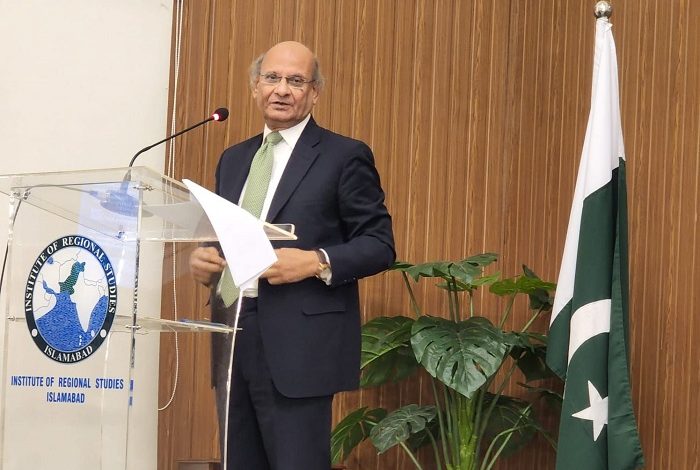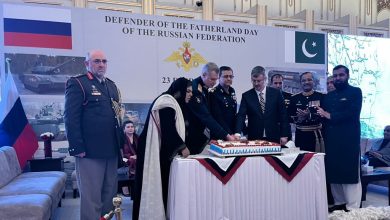CPEC to Broaden Benefits, cooperation says Dr. Khan

- Transforming CPEC from Bilateral to Regional Initiative to Broaden Benefits: Dr. Khan: Dr. Ashfaque Hasan Khan, DG NIPS, a leading policy think of Pakistan, based in Islamabad.
- CPEC improved Pakistan’s socio-economic conditions, developed infrastructure, and addressed energy shortages
- Connecting CPEC with CAREC could create a regional energy market, would benefit Central Asia and Afghanistan
- Integrating CPEC with development projects of Iran and Turkiye could forge regional cooperation partnerships
By: Muhammad Arif, Editor NSN.Asia
Islamabad: To promote broader regional connectivity and cooperation, the China-Pakistan Economic Corridor (CPEC) should be transformed from a bilateral project between China and Pakistan into a regional initiative by linking it with the Central Asia Regional Economic Cooperation (CAREC) Program, which includes 11 countries.
The proposal was presented by Dr. Ashfaque Hasan Khan, Director General NUST Institute of Policy Studies) (NIPS), a leading policy think of Pakistan, based in Islamabad.
Dr. Ashfaque Hasan Khan, a seasoned economist and policy maker of Pakistan, presented this proposal while delivering lecture on “Making CPEC a Regional Initiative” at a seminar titled “CPEC 2.0: Prospects and Challenges,” organized by the Institute of Regional Studies on July 31, 2024.
Highlighting the socio-economic gains of CPEC, Dr. Khan stressed the significance of regional connectivity for successful cooperation and integration. He highlighted the Belt and Road Initiative (BRI) and the China-Pakistan Economic Corridor (CPEC) as key projects that link countries and spread globalization’s benefits.

“The BRI, initiated by Chinese President Xi Jinping, involves over 150 countries and 40 institutions. CPEC, a flagship project of the BRI, has notably improved Pakistan’s socio-economic conditions since 2015 by addressing infrastructure and energy shortages, he stated.
On Central Asian connectivity through CPEC, Dr. Khan pointed out that Central Asia, rich in natural resources, contrasts with the energy needs of China and Pakistan. Connecting CPEC with CAREC could create a regional energy market. Afghanistan, a member of CAREC, could benefit economically by joining this initiative, serving as a gateway to Central Asia.
On integrating CPEC with regional development projects of Iran and Turkiye, Dr. Khan mentioned a $400 billion agreement between Iran and China, establishing their regional partnership.
“Integrating Iran into CPEC would benefit China, Pakistan, and Iran, leveraging their strategic relations and making CPEC a regional project”, he proposed.
“Turkey could also be integrated into CPEC, further enhancing its regional significance”, he added while recalling the former Regional Cooperation for Development (RCD) organization, consisting of Pakistan, Iran, and Turkey.
For further regional integration, Dr. Khan also proposed extending CPEC to Oman. With China being the largest importer of Oman’s oil, linking Gwadar Port in Pakistan with Muscat Port in Oman could improve regional connectivity and economic benefits, Khan stressed while highlighting the strong trading relationship between China and Oman.
Reflecting on cooperation in Gwadar port development projects, he suggested establishing an oil refinery in Gwadar, which would significantly reduce the transportation time of oil from Oman to China from 40-45 days to just seven days, offering substantial time and cost savings.
CPEC, as a development scheme, and as a regional cooperation project, has the immense potential and the benefits that needs to be transformed it into a regional initiative”, he concluded.

Dr. Khan was joined by a panel of distinguished speakers, including Honorable Federal Minister for Planning, Development, and Special Initiatives, Ahsan Iqbal Chaudhry; Senator Mushahid Hussain Sayed, Chairman of the Pakistan-China Institute; Mr. Yang Nuo, Minister Counsellor at the Embassy of the People’s Republic of China; Ambassador Naghmana Hashmi; Dr. Hasan Daud Butt; and Mr. Khalid Taimur Akram.






